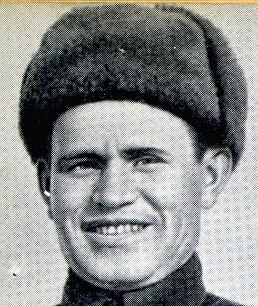
Vasilly Zaitsev

Vasiliy Zaitsev
Already Russian newspapers had made the name Vasiliy Zaitsev
famous.
In but ten days' time he had killed nearly forty Germans, and correspondents
gloatingly,wrote of his amazing ability to destroy his enemies with a single
bullet. It was a skill he had learned while shooting deer in the forests around
Elininski, his home in the Ural Mountain foothills. A shepherd in the summers,
Zaitsev, at the age of fifteen, went off to technical school in Magnitogorsk.
On September 20, 1942, the broad-faced Zaitsev came to Stalingrad with the
284th Division. Now he was a national hero, and as his fame spread across
no-man's-land, the Germans took an inordinate interest in him.
The Zaitsev - Thorwald story :
The ruins of Stalingrad were the natrual habitat of snipers, and each army
had its recognized
champions. For the Russians, Vasily Zaitsev was the onetime shepherd who had
perfected his
marksmanship hunting deer in the Ural foothills. In one ten day period, he had
killed no fewer
than 40 Germans and his fame had spread into enemy lines. The Germans retaliated
by flying
to the scene SS Colonel Heinz Thorwald, head of their snipers' school near
Berlin. Zaitsev
soon heard talk of the deadly Thorwald, and he set down a tense account of their
dual to
the death.
"The arrival of the Nazi sniper set us a new task," wrote Zaitsev.
"We had to find him, study
habits and methods, and patiently await the moment for one, and only one,
well-aimed shot."
For two days, Zaitsev stalked his rival, trying to locate his precise
whereabouts. On the third
day, Zaitsev was accompanied in his search by a political instructor named
Danilov. As the
two lay hidden, peering intently through their telescopic sights, Danilov
suddenly said: "There
he is! I'll point him out to you!" Recalled Zaitsev: "He barely,
literally for one second,
but carelessly, raised himself above the parapet, but that was enough for the
German to
hit and wound him.
"For a long time I examined the enemy positions, but could not detect
his hiding place.
To the left was a tank, out of action, and on the right was a pillbox. Where was
he?
In the tank? No, an experienced sniper would not take up position there. In the
pillbox,
perhaps? Not there, either - the embrasure was closed. Between the tank and the
pillbox,
on a stretch of level ground, lay a sheet of iron and a small pile of broken
bricks. It had
been lying there a long time and we had grown accustomed to its being there. I
put myself
in the enemy's position and thought - where better for a sniper? One had only to
make a
firing slit under the sheet of metal, and then creep up to it during the
night."
To test his theory, Zaitsev rasied a small plank with a mitten attached to
its end. A shot
rang out and a bullet smashed into the plank. "Now," wrote Zaitsev,
"came the question of
luring even a part of his head into my sights." Before that could be done,
however, Zaitsev
would have to change his own position, which had clearly been marked by the
German.
Zaitsev and a fellow sniper, Nikolai Kulikov, spent much fo the night working
their way
to a new vantage point. By dawn they were ready.
"The sun rose," Zaitsev recalled. "We had decided to spend the
morning waiting, as we
might have been given away by the sun on our telescopic sights. After lunch our
rifles
were in the shade and the sun was shining directly on the German's position. At
the
edge of the sheet of metal something was glittering: an odd bit of glass - or
telescopic
sights? Kulikov carefully, as only the most experienced can do, began to raise
his helmet.
The German fired. For a fraction of a second Kulikov rose and screamed. The
German
believed he had finally got the Soviet sniper he had been hunting for four
days,and half
raised his head from beneath the sheet of metal. That was what I had been
banking on.
"I took careful aim. The German's head fell back, and the telescopic
sights of his rifle
lay motionless, glistening in the sun until night fell." Russian sources
credited Vasily
Zaitsev with killing 144 (232 ?) Germans before the end of the battle of
Stalingrad. Then he
was blinded by a detonating land mine.